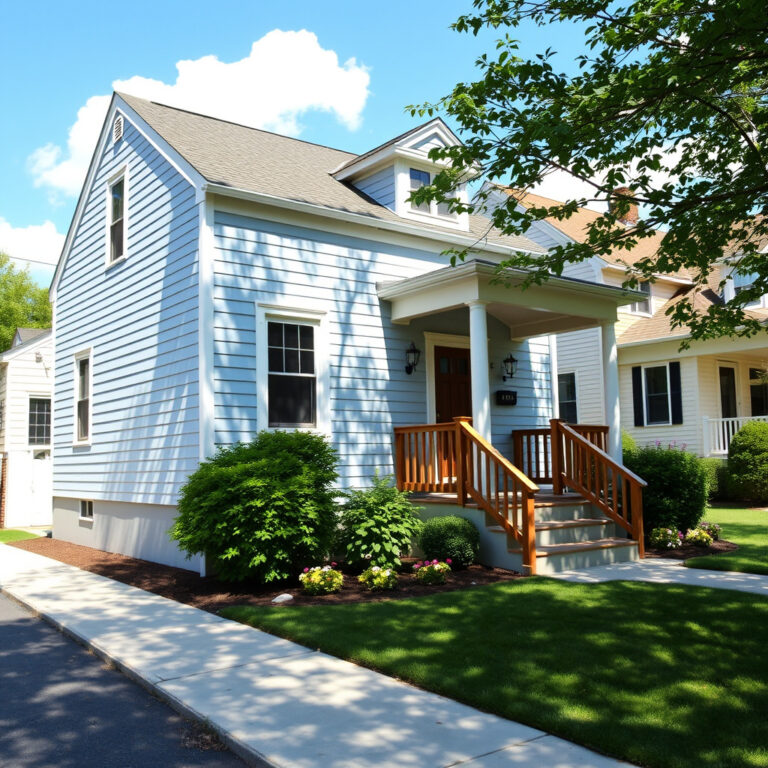Home renovation permits are legal approvals required before starting construction or renovation projects, ensuring safety and compliance with local regulations.
Home renovation permits are crucial for any improvement project you undertake in your home.
In this post, you will discover what these permits entail, why they are necessary, and how to obtain them without hassle.
Whether you’re a homeowner looking to enhance your living space or a property investor aiming to maximize value, understanding home renovation permits will empower you to navigate your project smoothly. Get ready to unlock the secrets to a successful renovation!
The Importance of Home Renovation Permits for Your Project
When embarking on a home renovation journey, one of the crucial steps that often gets overlooked is obtaining the necessary home renovation permits. These permits are not just bureaucratic red tape; they serve essential purposes that ultimately benefit you as a homeowner. Understanding the importance of these permits can save you from potential headaches down the road.
Why Are Home Renovation Permits Necessary?
First and foremost, home renovation permits ensure that your project complies with local building codes and regulations. These codes are designed to guarantee safety and quality in construction. When you apply for a permit, local authorities will review your plans to ensure they meet safety standards. This process protects you, your family, and future occupants from hazards that could arise from improper construction practices.
Avoiding Fines and Legal Issues
Another vital reason to obtain home improvement permits is to avoid potential fines or legal complications. If you undertake a renovation without the necessary permits, you could face hefty penalties. In some cases, authorities might require you to undo or modify your work to comply with regulations, leading to unnecessary expenses and frustration. By getting the proper permits upfront, you can avoid these pitfalls and ensure a smoother renovation experience.
Increased Property Value
Obtaining renovation permit requirements also contributes to the long-term value of your property. When future buyers see that your renovations were properly permitted, it instills confidence in the quality and safety of the work done. This can be particularly important for larger projects like a new deck or kitchen remodel. For example, if you’re considering innovative kitchen design ideas or modern bathroom design ideas, having the right permits can make your home more appealing when it comes time to sell.
Peace of Mind
Knowing that your project is compliant with local regulations can provide peace of mind. This is especially true for major renovations such as adding an extension, remodeling a kitchen, or redesigning your bathroom. For instance, if you’re planning significant bathroom renovation costs, having the correct bathroom renovation permits can assure you that the work will be done to a high standard, reducing the likelihood of issues arising later.
Engaging Professionals
If you choose to hire contractors for your renovation, they will likely understand the importance of building permits for renovations. A reputable contractor will guide you through the permitting process, ensuring that everything is in order before starting the work. This collaboration can be invaluable, especially when it comes to specialized projects such as exterior home painting or finding the best deck builders near me.
Types of Permits You Might Need
Depending on the scope of your renovation, different permits may be required. Here’s a brief overview of some common types of permits:
- Kitchen remodeling permits – Required for major changes in layout or plumbing.
- Bathroom renovation permits – Necessary for alterations that affect plumbing or electrical systems.
- Deck construction permits – Essential for building new decks to ensure safety compliance.
- Painting permits – May be required in certain areas, especially for exterior projects.
- Property improvement permits – General permits for various enhancements to your home.
Understanding the importance of home renovation permits not only helps ensure your project goes smoothly, but it also protects your investment in your home. By taking the time to secure the necessary permits, you can focus on the exciting aspects of your renovation, whether that’s selecting the perfect exterior home design or planning a beautiful new bath.
How to Determine Which Home Renovation Permits You Need
When embarking on a home renovation project, understanding the necessary permits is crucial to ensure compliance with local regulations. Home renovation permits can vary based on the scope of your project, so it’s essential to identify the specific requirements that pertain to your situation.
Understanding the Basics of Home Renovation Permits
Home renovation permits are legal documents issued by your local government that grant you permission to carry out certain changes to your property. These permits ensure that your renovations align with safety standards, zoning laws, and building codes. Failing to obtain the correct permits can lead to fines, delays, or even the need to undo completed work.
Assessing Your Renovation Project
Before diving into the permit process, take a moment to assess your renovation project. Ask yourself the following questions:
- What type of work am I planning? (e.g., kitchen remodeling, bathroom renovation, or deck construction)
- Will my project significantly alter the structure or footprint of my home?
- Am I making changes that affect plumbing or electrical systems?
- Will I need to make modifications to the exterior of my home?
Understanding the nature of your project will help you determine which home improvement permits you need.
Common Types of Renovation Permits
Depending on your project, you may need one or more of the following permits:
- Building Permits for Renovations: Required for structural changes or additions.
- Kitchen Remodeling Permits: Often necessary for significant changes to plumbing, electrical work, or layout.
- Bathroom Renovation Permits: Similar to kitchen permits, these are needed for major alterations.
- Deck Construction Permits: Required if you’re building a new deck or making substantial changes to an existing one.
- Exterior Home Painting Permits: Sometimes needed, especially if your home is located in a historic district.
Researching Local Requirements
Every locality has its own set of rules regarding renovation permit requirements. Start by visiting your city or county’s website, which typically has a section dedicated to building permits. You can also contact your local building department directly for guidance. They can provide specific information about the permits needed for your project and help you understand any associated fees.
Consulting Professionals
If you’re feeling overwhelmed, consider consulting with professionals who specialize in home renovations. Deck builders near me, contractors, or architects can offer valuable insights into what permits you may need. They are often familiar with local regulations and can assist you in navigating the permitting process efficiently.
Staying Organized
As you gather information and apply for your permits, keeping everything organized is essential. Create a folder (physical or digital) where you can store all relevant documents, including application forms, receipts, and correspondence with local authorities. This will not only help you stay on track but also make it easier to reference important information throughout your renovation journey.
By taking the time to understand which home renovation permits you need, you set yourself up for a smoother renovation experience. Whether it’s implementing stunning kitchen design ideas, transforming your space with bathroom design ideas, or planning an exciting deck project, knowing the proper requirements will keep your project on the right path.
Navigating the Permit Application Process: A Step-by-Step Guide
When it comes to home renovation permits, understanding the application process is crucial for a smooth project. The journey begins with gathering all necessary information about your renovation plans. Carefully outline what you intend to change, whether it’s a new deck, a kitchen remodel, or even exterior home painting. Each type of project may have different requirements and regulations, so being precise is key.
Step 1: Research Local Regulations
Before diving into the application, take the time to research local building codes and zoning laws. These regulations can vary significantly depending on your location. Check with your local building department to find out what specific renovation permit requirements apply to your project. This will help you determine what permits you will need, such as kitchen remodeling permits or deck construction permits.
Step 2: Prepare Your Documents
Once you know what permits you need, it’s time to prepare the necessary documentation. This typically includes detailed plans of your project, specifications, and any other required forms. If you’re unsure about how to create these documents, consider consulting with professionals. Architects or designers can provide valuable insights, especially when it comes to kitchen design ideas or bathroom design ideas that meet local codes.
Step 3: Submit Your Application
With your documents in hand, you can now submit your permit application. This step often involves visiting your local building department and filling out the required forms. Be prepared to pay any associated fees at this stage. The cost can vary widely based on your location and the scope of your project, so it’s wise to budget accordingly for items like bathroom renovation costs or other related expenses.
Step 4: Await Approval
After submission, your application will go through a review process. This can take anywhere from a few days to several weeks, depending on the complexity of your project and the workload of the department. During this time, be open to feedback. Inspectors may request additional information or modifications to your plans. Staying engaged and responsive will help to keep things moving along.
Step 5: Obtain Final Approval and Start Your Project
Once your application is approved, you will receive your home improvement permits. This is your green light to begin your renovation. Make sure to keep these permits on site during the project, as you may need to show them to inspectors at various stages of construction. If you are working with deck builders near me or other contractors, ensure they are aware of the permits and regulations to avoid any interruptions.
Step 6: Schedule Inspections
As you progress, certain stages of your project will require inspections to ensure compliance with safety codes and standards. Be proactive in scheduling these inspections. Whether it’s for electrical work, plumbing, or structural changes, having the right inspections will help you avoid complications down the road.
By following these steps, navigating the permit application process can become a more manageable task, allowing you to focus on bringing your vision to life with confidence. Remember, each project is unique, so adapt these guidelines to fit your specific needs, whether you’re enhancing your exterior home design or transforming the interior space.
Common Myths About Home Renovation Permits Debunked
When embarking on a home renovation journey, many homeowners often encounter a series of misconceptions surrounding home renovation permits. Understanding the reality behind these myths is crucial for a smooth and successful project. Let’s unravel some of the most common myths that can cloud the renovation process.
Myth 1: Permits Are Only Needed for Major Projects
One prevalent belief is that home improvement permits are only necessary for large-scale renovations. In reality, even seemingly minor changes, such as installing new windows or altering plumbing, can require permits. Local regulations vary, so it’s essential to check the specific renovation permit requirements in your area, as what seems minor to one person may require official approval.
Myth 2: Obtaining a Permit Is a Lengthy Process
Many homeowners fear the permit application process will take forever, causing unnecessary delays in their projects. While it’s true that some applications can take time, many jurisdictions have streamlined their processes. By preparing the necessary documents and following local guidelines, you can often secure your building permits for renovations more quickly than anticipated.
Myth 3: You Can Skip Permits If You’re Hiring Contractors
Some individuals believe that hiring professionals absolves them from obtaining necessary home remodeling permits. This is a misconception. While contractors may assist in the permit process, the responsibility ultimately falls on the homeowner. Failing to secure the required permits can lead to fines, and additional costs, or even the need to undo completed work.
Myth 4: Permits Are Just a Way for Cities to Make Money
Another common myth is that permits exist solely to generate revenue for municipalities. However, the true purpose of homeowners renovation permits is to ensure safety and compliance with local building codes. These regulations are in place to protect homeowners and their properties, ensuring that renovations are safe, structurally sound, and up to code.
Myth 5: You Can’t Make Changes Once a Permit Is Issued
Once a permit is granted, many believe they cannot make any adjustments to their plans. While significant changes may require a new permit, minor modifications often can be accommodated with a simple amendment to the existing permit. Always communicate with your local building department to understand the flexibility available in your project.
Myth 6: All Permits Are the Same
It’s a common mistake to think that all renovation permits are interchangeable. Different types of projects require specific permits, such as kitchen remodeling permits, bathroom renovation permits, or deck construction permits. Each type has its own set of regulations and requirements, making it vital to identify which permits are relevant to your project.
Myth 7: Homeowners Can Pull Permits for Any Work
Lastly, there’s a belief that all homeowners can easily pull permits for any kind of work. While many jurisdictions allow homeowners to obtain permits, some require that licensed professionals handle specific types of projects. It’s important to verify the rules in your area to ensure compliance and avoid complications.
In conclusion, navigating the world of home renovation permits can be daunting, but debunking these myths can empower homeowners to approach their projects with confidence and clarity. Always consult local regulations and consider seeking professional guidance if you are unsure about any aspect of the permit process. With the right information, your renovation can be a rewarding experience that enhances your home’s value and functionality.
Consequences of Skipping Home Renovation Permits
When embarking on a home renovation project, it might be tempting to bypass the necessary home renovation permits. However, this decision can lead to a variety of significant repercussions that can impact your property, finances, and peace of mind. Understanding these consequences is crucial to ensure that your project goes smoothly and adheres to local regulations.
Legal Repercussions
One of the most pressing issues that arise from skipping home improvement permits is the potential for legal trouble. Many municipalities require permits to ensure that renovations comply with building codes and safety standards. If you skip this step, you may face fines and penalties, which can escalate quickly. Local authorities may also require you to halt your project until the necessary permits are obtained, leading to costly delays.
Financial Implications
Beyond fines, there are other financial implications to consider. Homeowners who neglect renovation permit requirements may find themselves responsible for retroactive permits, which can be costly and time-consuming. Additionally, if you ever decide to sell your home, unpermitted work could complicate the sale process, potentially reducing your property’s value or leading to more negotiations with buyers.
Insurance Complications
Insurance companies typically require documentation of all renovations. If damage occurs as a result of unpermitted work, your insurance may not cover repairs. This can leave you vulnerable to significant out-of-pocket expenses. It’s essential to keep in mind that building permits for renovations not only protect you during the renovation process but also safeguard your investment in the long run.
Safety Concerns
Skipping permits can also jeopardize the safety of your home. Building codes are designed to ensure that renovations meet specific safety standards. Without the oversight that permits provide, you risk introducing hazards into your home. For example, improperly installed electrical work or structural changes can lead to serious safety issues, putting your family at risk.
Impact on Future Renovations
If you plan to continue making improvements in the future, having a history of unpermitted work can complicate matters. Future renovations may require inspections that could uncover the previous unpermitted work, resulting in additional costs and stress. It’s far more beneficial to start your renovation journey on the right foot by securing the necessary home remodeling permits.
Community Relationship
Skipping permits can strain your relationship with your community. Neighbors may report unpermitted work to local authorities, leading to complaints that could escalate further. Maintaining a good rapport with your community is essential, especially if you ever wish to make further changes or improvements to your property.
Conclusion
In light of these potential consequences, it is clear that securing the appropriate home renovation permits is not just a bureaucratic formality but a critical step that can safeguard your home, finances, and future. Whether you’re considering kitchen design ideas, bathroom design ideas, or even looking for deck builders near me, always prioritize the necessary permits to ensure a successful and compliant renovation process.
How to Expedite the Home Renovation Permit Process
Navigating the world of home renovation permits can feel overwhelming, but there are effective strategies to speed up the process. Understanding the requirements and taking proactive steps can save you time and stress, allowing you to focus on transforming your space.
Organize Your Documentation
Before you even start the application process for your home improvement permits, gather all necessary documents. This includes architectural plans, site surveys, and any previous permits related to your property. Having everything in order can significantly reduce delays. A well-organized submission demonstrates your preparedness and can help the approval process move smoothly.
Consult with Local Authorities
Each locality has its own set of renovation permit requirements. Contact your local building department to discuss your project. By asking questions up front, you can clarify what permits you need, whether it’s for kitchen remodeling permits, bathroom renovation permits, or deck construction permits. This proactive approach not only saves time but also ensures that you’re on the right track.
Utilize Professional Services
Consider hiring professionals who specialize in navigating the permit process. Whether it’s a contractor or an architect, they bring expertise in dealing with local regulations and can help streamline your application. Their knowledge can also prevent common pitfalls that lead to delays, ensuring that your renovation runs on schedule.
Submit Complete Applications
When it’s time to submit your application, ensure that every detail is complete. Missing information is a common reason for delays. Double-check all forms, attach necessary documents, and provide clear descriptions of your project. If you’re applying for painting permits or property improvement permits, specificity regarding your plans can expedite the review process.
Follow Up Regularly
After submitting your application, don’t hesitate to follow up with the relevant department. A simple call or email can keep your application on their radar and may even expedite its review. Staying engaged shows your commitment to the project and can help you address any questions or issues that arise promptly.
Be Prepared for Inspections
Once your permits are approved, be ready for inspections. Schedule them as soon as possible and ensure that your project aligns with the approved plans. Having all necessary documentation on hand during inspections can facilitate a smoother process. If you’re working on exterior home design or any structural changes, compliance with building codes is crucial.
Stay Informed About Local Regulations
Regulations can change, so staying informed about any updates in your area can help you navigate the process more efficiently. Subscribe to local newsletters or follow community forums that discuss building permits for renovations. Being proactive can prevent unexpected delays caused by new requirements.
By following these steps, you can significantly expedite the home renovation permit process, allowing you to bring your kitchen design ideas, bathroom design ideas, or exterior home painting projects to life without unnecessary hold-ups. Remember, being prepared and informed is key to a successful renovation experience.
Staying Informed: Changes in Home Renovation Permit Regulations
In the dynamic world of home renovation, staying updated on the latest regulations regarding home renovation permits is essential for homeowners and contractors alike. Understanding the changes in these regulations can significantly impact your renovation plans, from budgeting to execution.
As local governments strive to enhance safety and sustainability in construction, they often revise the requirements for home improvement permits. These changes can affect a variety of projects, including kitchen remodeling permits, bathroom renovation permits, and even deck construction permits. It’s crucial to be aware of what these modifications entail to avoid any complications during your renovation journey.
Understanding New Permit Requirements
Recent updates may introduce stricter guidelines or new documentation requirements. For instance, if you’re considering a project that involves structural changes, like adding an extension or an open-concept layout, you may now need to submit additional architectural plans or engineering reports. Homeowners might also be required to demonstrate compliance with energy efficiency standards, which are becoming increasingly prevalent in permit applications.
To navigate these changes effectively, you should familiarize yourself with the specific renovation permit requirements in your area. This can usually be achieved by visiting your local government’s website or contacting your municipal office.
Impact on Project Timelines
Changes in building permits for renovations can also affect project timelines. Increased scrutiny in the approval process might lead to longer wait times for permits, resulting in delays in starting your renovation. This is particularly relevant for popular projects like exterior home painting or significant interior updates. To mitigate potential delays, ensure that all your paperwork is complete and accurate before submission. This includes not only the application itself but also any necessary supporting documents, such as property surveys or contractor agreements.
Keeping Communication Open
Staying informed about these changes requires communication—both with local authorities and your renovation team. If you’re working with deck builders near me or a general contractor, ensure that they are up-to-date with the latest regulations. A proactive approach can help you avoid misunderstandings and ensure that your project adheres to all legal requirements.
Moreover, if you’re exploring kitchen design ideas or bathroom design ideas, it might be wise to involve your contractor early in the design phase. They can offer insights into which aspects of your plans may require specific permits, helping you to streamline the approval process and avoid any surprises down the road.
Staying Ahead of Regulations
In a world where regulations can change swiftly, homeowners should adopt a mindset of continual learning. Subscribing to local construction newsletters, attending community meetings, or joining homeowner associations can be excellent ways to stay informed. These avenues often provide updates on upcoming changes to homeowners renovation permits and can also offer a platform to voice concerns or suggestions regarding local building policies.
By taking the initiative to understand and adapt to changes in property improvement permits, you not only enhance the likelihood of a smooth renovation but also contribute to a safer and more sustainable community. Whether you’re planning a comprehensive remodel or a simple update, being informed is the key to a successful project that meets all necessary regulations and standards.
Maximizing Home Value Through Permitted Renovations
When considering home renovations, understanding the role of home renovation permits is crucial not just for compliance, but also for enhancing your property’s value. Permitted renovations not only ensure that your project meets local building codes, but they also assure potential buyers that the work done is legitimate and up to standard. This can significantly increase the market appeal of your home.
Identifying Valuable Renovations
Certain renovations tend to yield a higher return on investment. For instance, kitchen remodeling is often at the top of the list. Implementing effective kitchen design ideas can transform your cooking space into a modern, functional area that attracts buyers. Similarly, bathroom upgrades are essential; with thoughtful bathroom design ideas, you can create a spa-like retreat that enhances your home’s allure. Remember to factor in bathroom renovation costs to ensure your plans align with your budget.
Understanding the Permit Process
Navigating the process of obtaining the necessary permits is a foundational step that can’t be overlooked. Each type of renovation, whether it involves structural changes or aesthetic upgrades, typically requires specific home improvement permits. For instance, if you are planning to build a deck, working with local deck builders near me can streamline this process. They can guide you through necessary deck construction permits, ensuring compliance while maximizing your project’s potential.
Enhancing Curb Appeal
Exterior updates play a significant role in increasing home value. Consider investing in exterior home painting and landscaping to elevate your property’s first impression. Even simple changes, like updating siding or enhancing exterior home design, can make a world of difference. These improvements not only enhance the aesthetic but can also lead to a quicker sale at a better price.
Ensuring Compliance and Value
It’s important to remember that not all renovations require a permit, but when they do, ensuring compliance with local regulations can protect your investment. Unpermitted work can lead to complications down the line, such as fines or even the need to undo the renovations. Adhering to renovation permit requirements is a proactive approach to safeguarding your home’s value.
In conclusion, taking the right steps to secure home renovation permits and choosing the right renovations can significantly maximize your home’s value. Whether you’re looking to modernize your kitchen, transform your bathroom, or enhance your home’s exterior, understanding the process and investing wisely will pay off in the long run.

Sky Team – Home Renovation Experts. The Sky Team specializes in siding repair, painting, deck renovation, kitchen, and bathroom remodeling. We deliver quality craftsmanship and lasting solutions to enhance your home’s value and beauty.



